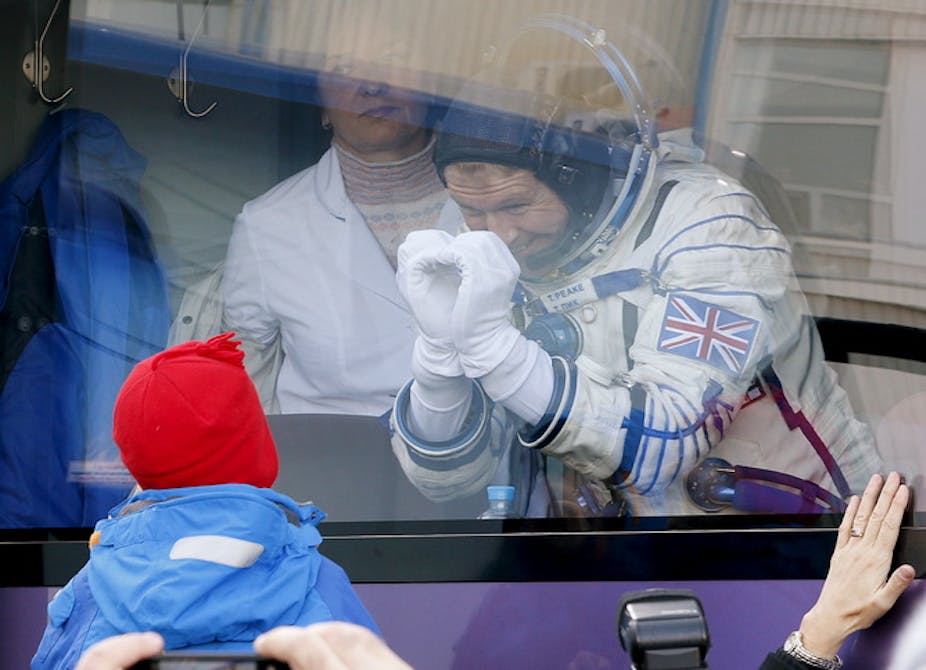Having spent days following him around, it was amazing to finally see the first official UK astronaut, Major Tim Peake, launched into space from Russia’s Baikonur cosmodrome in Kazakhstan. He’s been through six years of training to get to this moment, and will do a six-month tour of duty on the International Space Station.
I was part of the press team that followed Peake and his crew mates Tim Kopra (NASA) and Yuri Malenchenko (Roscosmos) around as they went through the final few tests prior to their launch. It was a really interesting experience seeing all the strange traditions taking place away from the public eye – and not just from the point of view of finding out about astronaut preparation.
The launch itself was spectacular: the white Soyuz rocket, arrowing into the clear blue sky, the blaze of flame from the engines, shortly followed by the thunder or their sound. Plenty of cliches in that description, but all are true. It took only a few seconds for the rocket to disappear from view – a tiny bright dot gradually fading as it gained height. Shortly afterwards came the announcement that the third stage had separated. This was the signal that the spacecraft was on its final course to the International Space Station – and that Major Tim would be experiencing complete weightlessness for the first time.
If Gagarin did it …
It has been a bizarre few days, the high-tech reality of a rocket launch played out against the background of traditions that have grown up around the Russian (formerly Soviet) space programme.
Yuri Gagarin was the first man in space (in 1961), and almost everything he did prior to launch is repeated by current crews. So they watch a film, White Suns of the Desert – a Russian film set at the end of civil war when Fyodor Sukhov, a Red Army soldier, has to guard the harem of a guerrilla leader – the night before launch, because Gagarin did. They plant a tree in Heroes Avenue, because Gagarin did.

And they even “water” the bus, like Gagarin did. This last tradition is utterly bizarre – apparently, Gagarin needed a quick loo break before he climbed into his rocket, so when the bus carrying him arrived at the launch pad, he, er, relieved himself against the offside back wheel. So now, each crew member does the same … albeit in a slightly more sanitised way, by preparing a small bottle in advance, which is emptied against the wheel. Since this takes place out of the public eye, I cannot vouch for the accuracy of the story – but it sounds plausible given the rest of the traditions followed.
Some traditions have grown up since Gagarin. The crew walk out to the bus which takes them from the cosmonauts’ hotel (where they have lived “in quarantine” for the past two weeks) to the sound of the Russian song “Grass by your house” (a literal translation) about a cosmonaut in space thinking longingly of his home). On Monday, we watched as several priests from the Russian Orthodox church blessed the rocket. They sprinkled holy water over the base of the rocket – and then with considerable enthusiasm over the press pack. This is not a tradition which started with Gagarin in 1961 as religious observance was not encouraged in the Soviet Union.
Peake inspiration
Peake is not one of the pioneers of space exploration, or even commanding the mission. But he is special because of what he represents: a commitment to the European Space Agency’s Human Spaceflight Programme.

This may not seem hugely important at first sight – surely there are better ways of spending the millions of pounds going into the mission? But actually, the knowledge we are gaining through the experiments on the ISS – including new findings about ageing, neural degeneration, muscle wastage and so forth – will benefit us all. But you just have to look at the faces of the children who gathered at London’s Science Museum to watch the launch to realise that there is a much more important reason for the UK to remain part of the Spaceflight programme: inspiration.
The UK is chronically short of the scientists and engineers it needs for its high tech industries. We also don’t have enough teachers with science and engineering qualifications to educate the next generation of rocket scientists and astronauts – or the next generation of news reporters, IT specialists doctors and nurses. Peake’s launch has stirred the pride of a nation – or at least the youth of the nation, going by the enthusiasm with which an education campaign run by the UK Space Agency has been met.
It needed something like this space mission to get people talking – even if it is to disagree about the value of spending so much money on launching someone into space.
What will I take away from this experience? Not the launch, nor the excitement of being part of an historic occasion, but the voice of a little boy, one of Peake’s sons, crying as his father got on the bus: “I want to go with daddy.”

